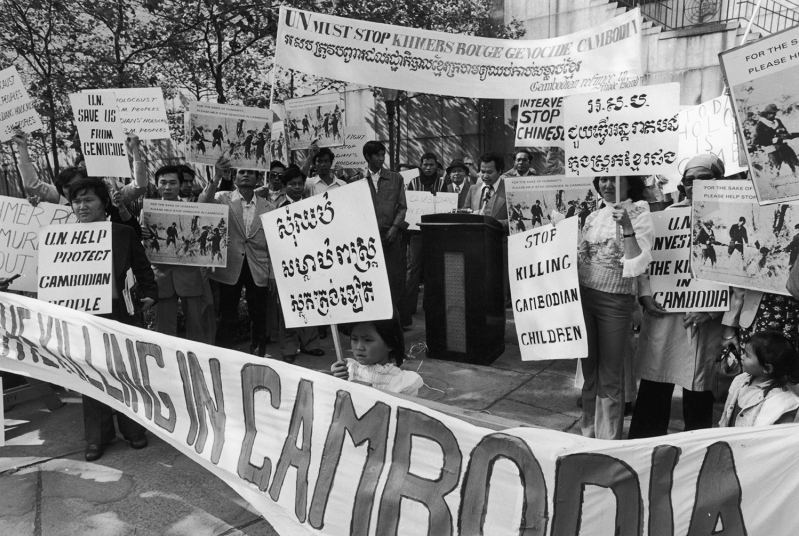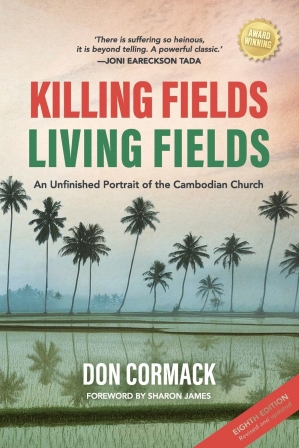

Published on: 04/17/2025
This news was posted by Fitness Fusion
Description

As Cambodia marks the 50th anniversary of the fall of its capital Phnom Penh to the Khmer Rouge, a final edition of a landmark book chronicling the rise of one of the 20th century’s most brutal regimes has been released to commemorate the occasion.
“Killing Fields, Living Fields” by Don Cormack, first published in 1997, returns in its eighth and final edition this week, coinciding with the anniversary of April 17, 1975 — the day when Khmer Rouge forces seized Phnom Penh and began evacuating the entire population into the countryside. That moment marked the beginning of nearly four years of terror under the regime of Pol Pot, during which up to 2 million Cambodians died through execution, starvation and forced labor.
Cormack, a British missionary with OMF International, had arrived in Cambodia shortly before the regime took power and later worked for five years in refugee camps on the Thai border. Fluent in Khmer, he documented firsthand accounts of survival, escape, and loss, becoming one of the West’s earliest and most important chroniclers of the atrocities.
His book not only recounts the horror of what became known as the “killing fields” but also traces the resilient growth of the Cambodian Protestant Church — a movement the Khmer Rouge tried to erase, yet which today has grown to more than 300,000 believers across the country.
A regime built on brutality
The fall of Phnom Penh ushered in what the Khmer Rouge declared “Year Zero,” as Pol Pot and his Marxist-Leninist cadre set out to create an agrarian utopia. Cities were emptied, hospitals evacuated, and intellectuals, civic leaders and professionals were among the first targeted for execution. Even Cambodians studying abroad were lured back under false promises of roles in the new government, only to be executed upon arrival.
Among the early chroniclers of this dark chapter was New York Times correspondent Sidney Schanberg, who witnessed patients being dragged from hospital beds, saline drips still in place, during the evacuation of the capital.
Cormack, who had entered Cambodia in 1974 to help train Christian leaders, was forced to flee but later returned to Southeast Asia to serve in the refugee camps. There, he gathered stories from survivors whose trauma and faith shaped the content of his future writing.
Redemption amid ruins
One of the book’s most striking stories is Cormack’s unexpected encounter in a refugee camp with Comrade Duch, the Khmer Rouge’s chief executioner and overseer of the notorious Tuol Sleng (S-21) prison. Duch had orchestrated the torture and deaths of thousands, personally signing hundreds of execution orders. Unaware of Duch’s identity at the time, Cormack was summoned to minister to Duch’s dying mother, a Christian.
Decades later, in 1999, journalist Nic Dunlop identified Duch living under a new name as a humanitarian worker. It emerged that Duch had converted to Christianity in 1996, was baptized, and would become the only Khmer Rouge leader to confess his crimes and publicly ask for forgiveness. He died in prison in 2020 with a Bible and hymnbook at his bedside.
In contrast, Khieu Samphan, the last living Khmer Rouge founder, remains in prison, unrepentant at age 93.
A book for the present moment

The final edition of Killing Fields, Living Fields, published April 15 by Dictum Press, combines Cormack’s gripping historical narrative with powerful personal testimonies. It sets the spiritual endurance of Cambodia’s Christians against the ideological cruelty of the Khmer Rouge — drawing parallels to other totalitarian regimes and calling readers to remember the lessons of history.
The book opens with the little-known beginnings of the Cambodian Protestant Church and spans the decades of growth, suppression and eventual resurgence of Christianity in the country. Alongside the full-length edition, a shorter volume titled Ten Stories from the Killing Fields has also been released.
Though Cambodia today is more associated with the temple complex of Angkor Wat and rising tourism, Cormack’s final edition serves as a sober reminder of its not-so-distant past — and the resilience of those who endured it.
Other Related News
04/18/2025
By Ian M Giatti Christian Post Reporter Friday April 18 2025A screenshot of the Karmelo ...
04/18/2025
By Samantha Kamman Christian Post Reporter Friday April 18 2025Kerry Hasenbalg is a spea...
04/18/2025
By Morning Star News Friday April 18 2025Burial of Pastor Subhash Baghel on Jan 27 2025 ...
04/18/2025
By Christian Today Friday April 18 2025King Charles is seen as he leaves Westminster Abb...
04/18/2025












